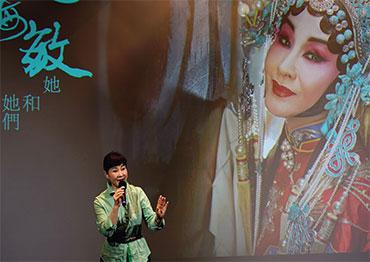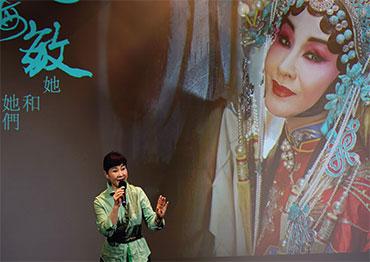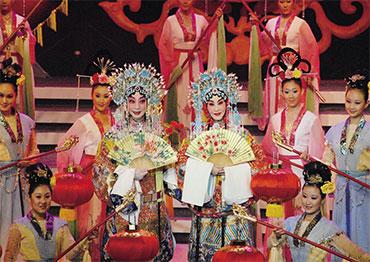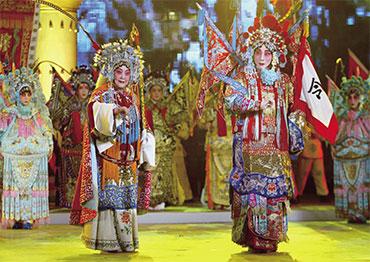orn in 1957, Wei Haimin began studying Peking opera as a child in China’ s Taiwan. In 1991, she became the first protégé of virtuoso Mei Baojiu (1934- 2016), the son of legendary performer Mei Lanfang, founder of the “Mei School” in Peking opera.
The Mei School combines female roles in Peking opera, such as young ladies, women of virtue and heroines, with martial arts skills. A typical example is Farewell, My Concubine, a Mei School classic. The opera centers on Yu Ji, a concubine of Xiang Yu, a general who overthrew the Qin, China’s first imperial dynasty, in the late 3rd century BCE.
At its climax, Yu commits suicide after performing a sword dance for a forlorn General Xiang following his defeat to former ally Liu Bang, founder of the succeeding Han Dynasty (202 BCE-9 CE). Yu kills herself with her sword because she does not want to burden Xiang in their escape. As Concubine Yu is celebrated as one of four great beauties in China’s history, her role not only requires a beautiful voice but also a classical figure and graceful yet difficult movements.
Wei Haimin has made a career portraying a wide range of characters in innovative productions, such as Cao Qiqiao in a staging of author Eileen Chang’s novel The Golden Cangue (1944). Cao is from a family with a small business who eventually makes her children the victims of her pursuit of wealth and love. In 2012, Wei played the role of Cleopatra in the experimental drama Cleopatra and Her Fools, an adaptation of Shakespeare’s Antony and Cleopatra that mixes Peking opera with elements of modern drama and musicals.
In an interview with China News Service (CNS), Wei shares her observations on the differences in representations of feminine beauty in Eastern and Western operatic traditions, as well as what opera has taught her about life.
CNS: How did Mei Lanfang portray female roles and express feelings of elegance and innocence?
Wei Haimin: While creating the opera A Thousand Stages, Yet I have Never Quite Lived in 2021, I brought my observations of the Mei School to two roles: Yang Yuhuan (the favorite concubine of Tang Dynasty Emperor Xuanzong in the 8th century) and Mu Guiying (a legendary female army commander from the 10th and 11th centuries).
Maestro Mei was born in 1894 during the final years of the Qing Dynasty, but rose to prominence after the fall of the Qing (1911) when Peking opera was no longer only for the imperial family. Society was seeking newness and change with an openness unlike old times. Once seen as supporting roles, female roles played by men (known as Dan) became leading characters through Mei Lanfang’s creative efforts. These roles brought mystery to the overall aesthetic, providing a sense of distance and some space for personal style.
Back in the 1920s, when there weren’t many choices for entertainment, gramophone records ushered in the golden age of Peking opera by bringing it to the largest potential audience. In 1927, the newspaper Shuntian Times named Mei Lanfang among “the Four Great Dans” for his production of The Anecdotes of Tai Zhen (in which he played the leading role Yang Yuhuan).
The opera made bold changes to the traditional storyline. For example, one of the major scenes shows Yang in a bath. Maestro Mei exquisitely expressed how shy the royal concubine is through his innovative vocal interpretation, and the stage setting of a steamy hot spring captured the audience’s imagination for the revered beauty. Mei wore a plain skirt and white silk to symbolize Yang’s nudity. Combined with his melodious and tender voice, he impressed audiences with Yang’s grace, elegance and purity.
This deeper portrayal of characters is a distinct feature of Mei Lanfang’s creations. In 1959, after taking a long hiatus from the stage, 65-year-old Mei Lanfang drew from the opera traditions of Henan Province for his classic Lady General Mu Takes Command. Mu Guiying, the elderly heroine, long ignored by the imperial court and absent from the battlefield, is hesitant to lead the army again to protect her country in trouble. Her grandmother-in-law persuades her to set aside her personal grievances and fight. Incredibly, instead of expressing this change of mind in words, Mei renders the heroine’s thoughts and concerns through dance.
Mu Guiying finally asks herself: “Haven’t I always been dedicated to my country and the people?”
This purity is touching and resonates with Mei’s life. I am fortunate that Lady General Mu Takes Command is my most performed Mei School play, and I aspire to giving my purest devotion to the art of Peking Opera.
CNS: How is feminine beauty represented in traditional Chinese aesthetics, and how does it differ from that portrayed in Western plays and artistic traditions?
WH: Unlike Western performing arts, which are divided into opera, ballet and so on, where characters are primarily portrayed either vocally or through body movement, Chinese opera is demanding for actors in an all-around way. A sweet voice is not enough for female roles in Chinese operas. They must also have a graceful figure. There is no limit to a performer’s talent. Everything is for beauty.
In addition, I feel strongly that feminine sexuality is perceived differently. Cleopatra is a beautiful and intelligent female ruler in Western stories. When I was in the opera Cleopatra and Her Fools, I realized women’s allure in a Western context is expressed through body language, including the way they talk and move. While we view this as seductive in Eastern cultures, it is natural and appreciated in Western cultures.
Despite the ancient Chinese saying “appetite and sex are human nature,” sexual attraction was taboo in ancient Chinese societies, especially in operas. Although portraits of courtesans’ feminine beauty are found in ancient Chinese literature, it still seems taboo among ordinary families, which I think is a very different aspect between East and West.
In every movement of female roles in Mei Lanfang’s plays, I find a feminine beauty that makes me feel like I’m breathing the fresh air of a spring breeze. Mei Baojiu, his son and my mentor, had always told me that Concubine Yu’s beauty is in her warm smile to her husband Xiang Yu, even after he had fallen from power. This tolerance, generosity and gentleness was what Xiang Yu found so attractive. This is also probably a case of different ways of beauty in different cultures.
CNS: Some of the operatic roles you have portrayed in recent years have strong, or even twisted and vicious personalities, very different from the gentle female characters common in traditional operas. How did these roles influence your art?
WH: Tradition defines them as “bad women.” But to me, they are women with strong personalities.
Adapted from the Greek tragedy Medea, Loulan Girl debuted in 1993. I have performed it for decades. When I first took on this role when I was young, I wondered why I had to show the audience the cruel mind of a woman who killed her children. But the more I played the role, the more I realized everyone has feelings of being let down or abandoned. While the audience is unlikely to take revenge like Medea, they could find catharsis and heal through the character.
I worked hardest on The Golden Cangue, adapted from a novella by Eileen Chang (1920-1995). Though the main character Cao Qiqiao seems to have no choices in her life, she still has control over some things. Yet she cannot take responsibility for her choices. In order to fully present Cao’s state of mind, I tried to show how she becomes a cruel-hearted old woman. She is from an ordinary family that runs a sesame oil business, but she is an ambitious and shrewd young girl. She marries the disabled second son of a rich family, but the wealth comes at the cost of her happiness. She blames everyone else for her misfortune.
From Cao’s point of view, her control over her children makes sense and is well-intentioned. When I thoroughly analyzed her state of mind, it became easier to find the right way to present her. Many people later told me they saw their own mothers in my portrayal of Cao. Too many mothers cling to their children and burden them with their lifelong grievances disguised as love.
I feel that there are lessons to be learned in every difficult relationship. Opera is my mentor, teaching me how to live my life. As long as I focus on opera, I’ll gain a new understanding of life.
CNS: Why is it so important to explore diverse female characters?
WH: Back in Mei Lanfang’s era, gender differences made it possible for him to create his unique artistic style through the beauty of female roles. Each of the four great Dan actors developed their own styles for female roles. In comparison, actresses are rather similar in appearance, performance, voice and body type, thus with little room to develop their own styles. But I have actual life experience as a woman in the modern world, which gives me more chance to analyze human nature. For performers today, I think the most important thing is to further explore the inner worlds of women. As a performer, I have to think about what audiences need, and how society is changing.
Women are less restricted nowadays, but there is still a lot we need to explore. Misunderstandings abound, and many women are left confined and disregarded. Many ideas about women are way too simplistic. And only the balance of both yin and yang can create a peaceful and good society. Of course, yin is not just exclusive to females. It is also the power of tolerance, compassion and gentleness among all human beings.
My own life experience has also enriched my performances. I didn’t grow up in a happy family. When I was around 50 years old, I realized operas mirror our lives. Many female characters make life choices that the audience may want to make but can’t in reality. Performers are essentially therapists that create a journey for the audience to experience with them. Understanding is based on experience. The further we reach into women’s inner worlds, the more possibility there is for understanding and reconciliation.

 Old Version
Old Version


